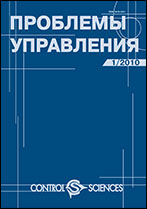|
Philosophical questions of control
From non-classical to post-non-classical science: an example of industrial operators' computer-based training systems
V. M. Dozortsev
Honeywell JSC, Moscow, Russia
Abstract:
A review of constructing and using of industrial operators' simulators in the framework of the periodization of scientific rationality from classical and non-classical to post-non-classical phase is given. The key post-non-classical characteristics of modern simulators are presented: self-development, interdisciplinarity, anthropocentric factor, orientation to practice. Special attention is paid to the simulation technique as a fundamentally new way to determine the response of a big technical system to user's arbitrary interventions, as well as to immersive tools for reproducing the trainees working environment. The post-non-classical role of the instructor was studied, combining the functions of a training organizer, a development agent, who initiates the reconfiguring of simulator's components and improving teaching methods, as well as a key link in the best professionals' knowledge capitalization. The fundamental changes in the simulator project organization and implementation are shown, covering now not only research and development, but also the maintenance and improvement of simulator systems. The transfer of skills acquired in the training and modern approaches to the automated assessment of the operators' work on the simulator are considered. The basic trends in the simulator constructing are analyzed: a change in the motives of training (the prevalence of workers' professional growth and self-realization), a generational shift against a revolutionary renewal of the means of labor (virtual and mixed reality, advisors based on artificial intelligence), the development and assessment of employees' professional competencies. Given the high synthetics of training technologies, the presentation is based on a wide conceptual context, including scientific, technical, cognitive-psychological, pedagogical, socio-economic and literary phenomena.
Keywords:
classical non-classical and post-non-classical scientific rationality, industrial processes, operators' computer-based training systems, self-developing systems, human-sizedness of complex technical systems, interdisciplinary approach.
Received: 22.09.2019
Revised: 05.11.2019
Accepted: 05.11.2019
Citation:
V. M. Dozortsev, “From non-classical to post-non-classical science: an example of industrial operators' computer-based training systems”, Probl. Upr., 2020, no. 2, 69–82
Linking options:
https://www.mathnet.ru/eng/pu1184 https://www.mathnet.ru/eng/pu/v2/p69
|

| Statistics & downloads: |
| Abstract page: | 130 | | Full-text PDF : | 38 | | References: | 30 | | First page: | 4 |
|




 Contact us:
Contact us: Terms of Use
Terms of Use
 Registration to the website
Registration to the website Logotypes
Logotypes








 Citation in format
Citation in format 